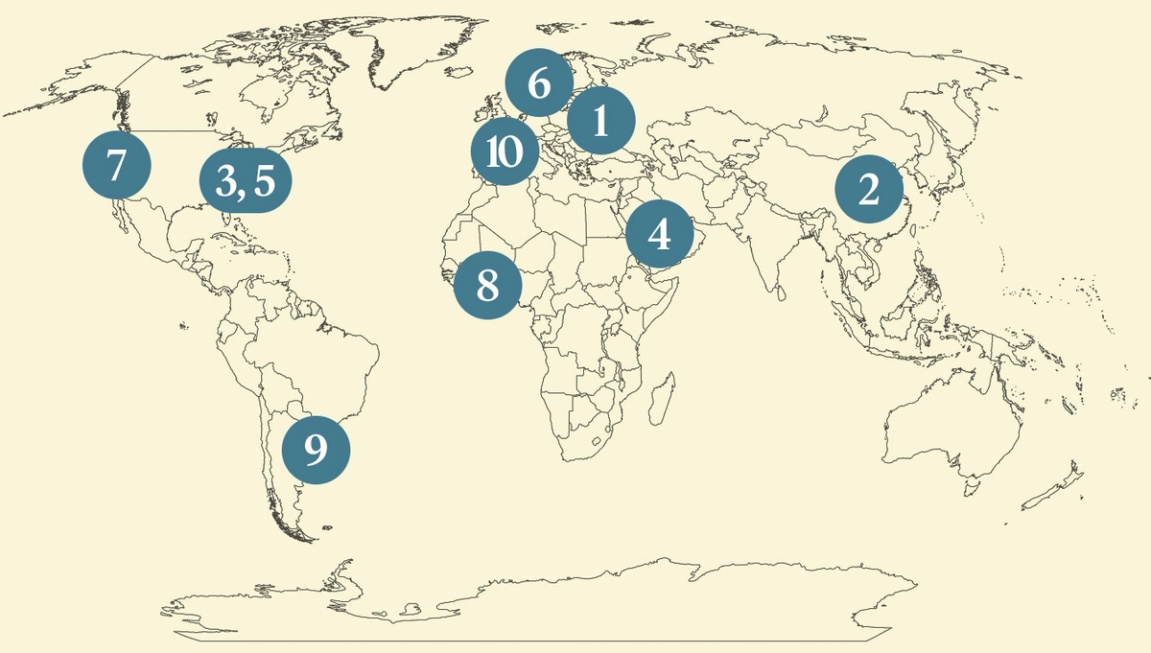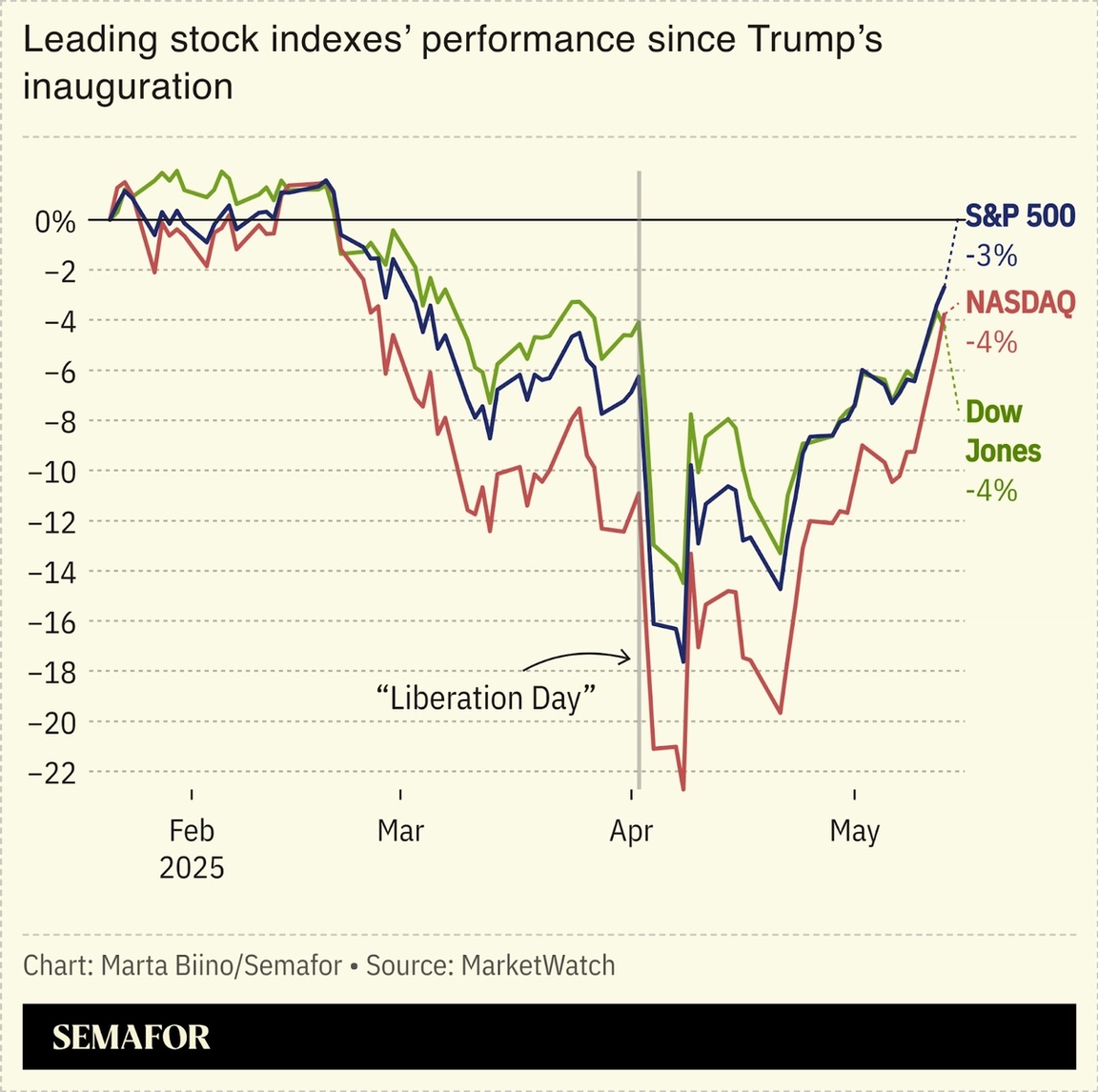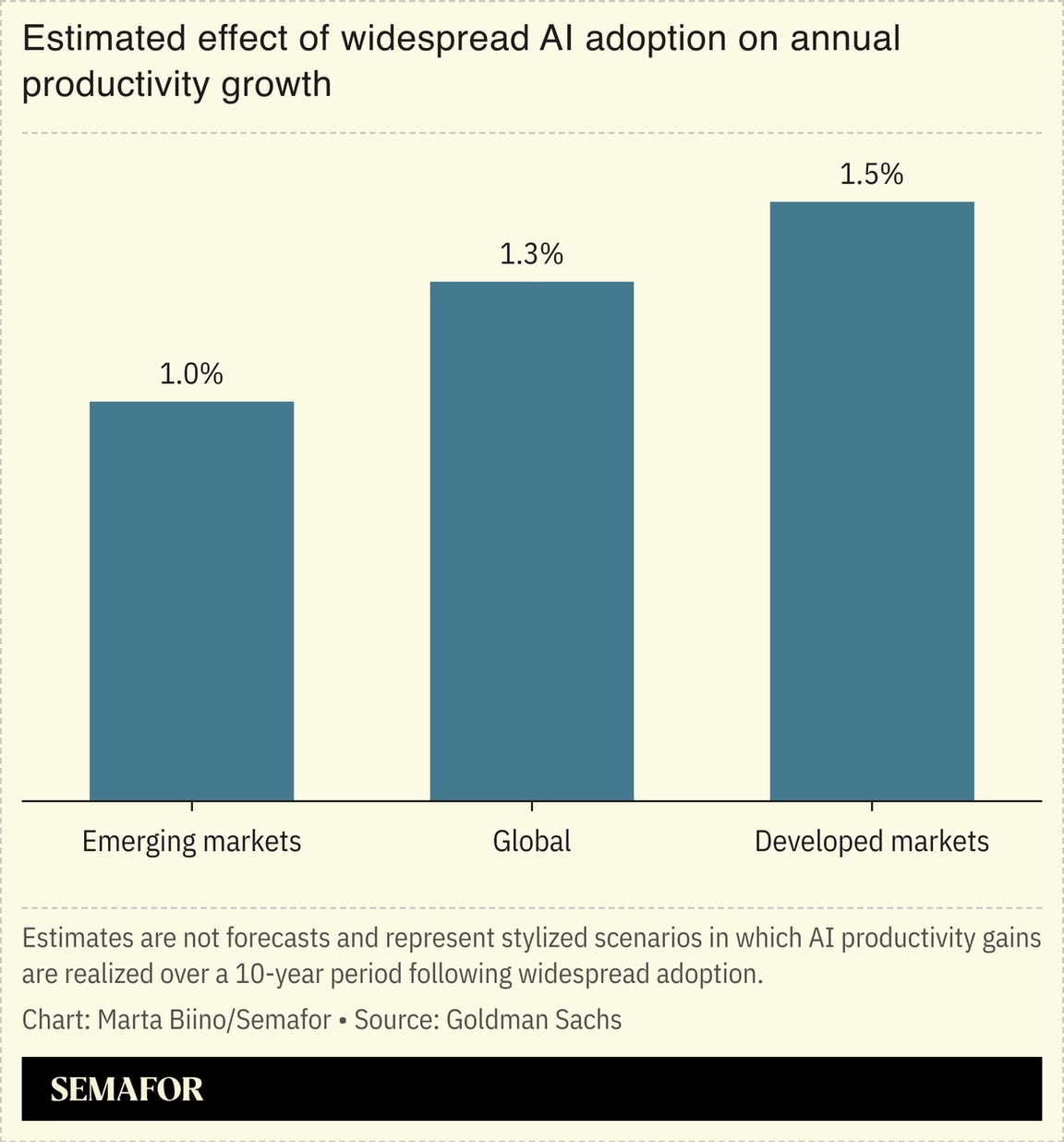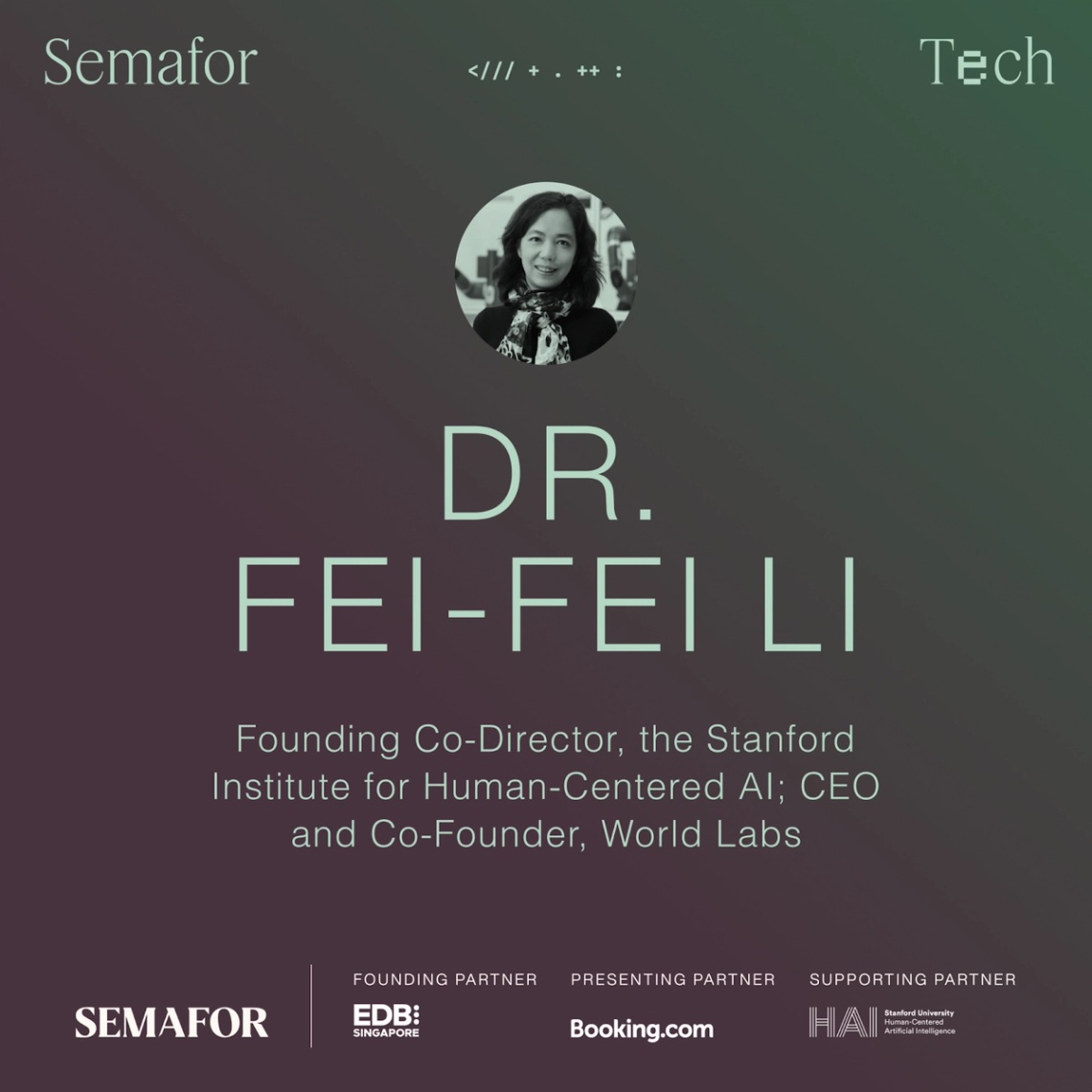| | The US and Europe pile pressure on Russia, AI’s promise and pitfalls revealed, and French wine touri͏ ͏ ͏ ͏ ͏ ͏ |
| |  | Flagship |  |
| |
|
The World Today |  - Pressure grows on Russia
- China growth boost
- Wall St up, Main St wary
- Trump heads to Qatar
- GOP’s AI regulation rule
- Norway fund’s AI savings
- AI research floods science
- Unlocking Africa’s pensions
- Uruguay ex-president dies
- French wine tourism up
 The evolution of vertebrate intelligence, and the Moomins at 80. |
|
Growing pressure on Moscow |
 Russia is under increasing international pressure to take concrete steps to end its war in Ukraine. French President Emmanuel Macron promised new sanctions targeting buyers of Russian oil and financial services, a sentiment echoed by the new German chancellor, while US President Donald Trump, who until recently appeared sympathetic to the Kremlin, has grown impatient with Moscow’s intransigence, the Financial Times reported. One Trump ally proposed a 500% tariff on countries which buy Russian fuel, with his plan receiving bipartisan support. It comes as Ukrainian President Volodymyr Zelenskyy prepares to fly to Turkey for peace talks, in an attempt to show Trump that his Russian counterpart Vladimir Putin, not Kyiv, is the obstacle to peace: Putin has not committed to attending. |
|
China hopes rise after trade reprieve |
 Analysts bumped up their projections for China’s economy this year, buoyed by Washington and Beijing suspending their tit-for-tat tariffs. Goldman Sachs, JPMorgan, Morgan Stanley, and UBS all raised their forecasts for GDP growth in the world’s second-biggest economy, while Citi and Nomura made bullish calls on Chinese and Hong Kong equities. Beijing also trumpeted its success in its standoff with Washington, with a former editor of the Communist Party mouthpiece Global Times writing, “This is called ‘victory’.” Yet even the upgraded economic forecasts fell below China’s own 2025 target of 5% GDP growth, and one analyst cautioned against excessive positivity over the US-China trade war reprieve: “This is a temporary pause, not a breakthrough,” she told CNBC. |
|
 Wall Street has recovered from the chaos unleashed by US President Donald Trump’s “Liberation Day” tariffs, but broader trust will take longer to rebuild, analysts warned. Major investment banks say a US recession is less likely after Washington suspended levies and reached a temporary deal with Beijing, but “it will likely take some time before confidence is restored among consumers, corporates, and foreigners,” Apollo’s chief economist argued. He pointed to tourism — which makes up 10% of US GDP — as a key indicator to watch. Early forecasts are troubling: The country stands to lose $12.5 billion in international travel spending this year, a 7% drop on last year. Small businesses, too, feel morose, with optimism declining for a fourth month. |
|
Trump’s Qatar controversy |
 Brian Snyder/Reuters Brian Snyder/ReutersUS President Donald Trump heads to Qatar today on the second leg of his Gulf tour, with controversy brewing over his plans to accept Doha’s gift of a luxury aircraft. The planned donation of the 747 — which will initially serve as Air Force One before being handed over to Trump’s presidential library — has sparked concern among Democrats and Republicans on ethics and security grounds: Opponents argue the gift violates anti-corruption rules, while GOP senators told Semafor they feared the intelligence implications of flying in a jet offered by a foreign nation. The controversy threatens to mar a trip that has focused on security and AI investment deals, and which today centers on a summit between the US and Gulf Cooperation Council. |
|
GOP to ban state AI regulation |
 Nathan Howard/Reuters Nathan Howard/ReutersUS Republicans added language to a budget bill which would ban state or local regulation of artificial intelligence for 10 years, the latest indicator of the partisan split on AI. The bill aims to cut spending, taxes, and clean energy subsidies. A new clause bars any “state or subdivision thereof” from regulating AI or “automated decision systems” — wording which would prevent states from enforcing existing laws. Blue states, notably California, home of Silicon Valley, have been active in regulating AI, and the bill’s wording would block existing legislation as well as incoming laws: Democrats called the proposal a “gift to Big Tech.” |
|
 Norway’s giant sovereign wealth fund said it would scale back hiring thanks to improvements in artificial intelligence. The $1.8 trillion fund employs 676 people, a number which has risen in recent years, but CEO Nicolai Tangen told the Norwegian Parliament that its work could be done more efficiently “through more use of technology,” including AI. Tangen, who has previously cited internal polls claiming a 15% productivity gain from AI, said compiling reports in 16 languages about the fund’s investments used to take days, but “now only takes 10 minutes.” Novo Nordisk, the maker of Ozempic, recently went from using 50 people to draft clinical reports to just three, thanks to generative AI. |
|
 Gustavo Fring/Pexels Gustavo Fring/PexelsLow-quality, artificial intelligence-generated studies are flooding the scientific literature, research suggested. Analysis found an “explosion of formulaic research articles” since 2021, which appear to have been created by AI scraping open-access datasets, finding a correlation between some variable and a health outcome, and reporting them as fact. The papers “look scientific but don’t hold up under scrutiny,” a researcher said. Pressure on scientists to publish research may be behind such “paper mills,” one of a number of examples of how AI can be misused, deliberately or naively: A California judge recently fined two law firms for filing a brief full of “false, inaccurate, and misleading legal citations and quotations,” apparently hallucinated by generative AI. |
|
 As AI continues to evolve at a rapid pace, companies are shifting from experimentation to real-world deployment and practical use within their businesses. Join Anthropic co-founder Jack Clark, World Labs co-founder and CEO Dr. Fei-Fei Li, Booking Holdings President and CEO Glenn Fogel, and Singapore Economic Development Board Executive Vice President Ih-Ming Chan for a discussion on the breakthroughs driving AI. Discussions will dive into how global, national, and regional AI ecosystems are shaping the technology’s future, and why building the policy frameworks governing them is more critical than ever for its potential. May 21, 2025 | San Francisco, CA | Request Invitation |
|
Africa looks to unlock pensions |
 Luc Gnago/Reuters Luc Gnago/ReutersEfforts to unlock trillions of dollars tied up in African pensions and other funds to pay for much-needed infrastructure were a hot topic at the Africa CEO Forum this week. The push has taken on renewed urgency in recent months as the US and major Western countries have sharply cut aid spending on the continent, and US tariff threats have upended longheld trading relationships. Multiple policymakers and bankers attending the conference of top African executives in Abidjan put forward proposals to address it. “There is about $4 trillion in Africa, mostly in banks, pension funds, and foreign reserves,” the CEO of the Africa Finance Corporation told Semafor. “The issue is, how we get it to flow into projects.” |
|
Austere Uruguay ex-president dies |
 Pablo La Rosa/File Photo/Reuters Pablo La Rosa/File Photo/Reuters |
|
|